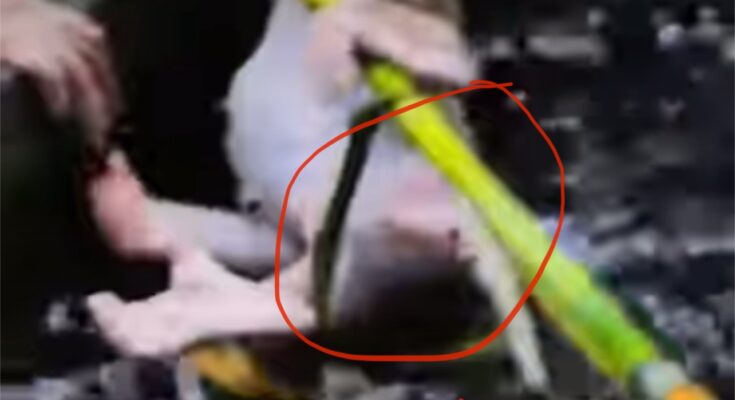In the dense forests of Southeast Asia, where the canopy hides stories both beautiful and brutal, a heart-wrenching incident unfolded that offers a glimpse into the complex and sometimes dark world of primate behavior. A small monkey, no more than a few weeks old, was seen wandering aimlessly after becoming separated from its mother. What followed was a shocking interaction that stunned onlookers—and raised important questions about survival, dominance, and empathy in the animal kingdom.
The Separation
According to eyewitnesses and wildlife researchers stationed in the region, the baby monkey, believed to be a macaque, was initially spotted clinging to a low branch, calling out in distress. Its mother had likely fallen victim to a predator or possibly poachers—a tragic but common occurrence in areas where human activity encroaches on natural habitats.
Alone and confused, the infant’s calls eventually attracted the attention of a larger monkey from a neighboring troop. But instead of offering protection or comfort, what happened next shocked everyone.
A Terrifying Encounter
The large monkey—possibly a dominant male—approached the baby with what initially appeared to be curiosity. However, the encounter quickly escalated into aggression. The adult grabbed the infant and carried it toward a shallow stream nearby. Observers watched in horror as the larger monkey repeatedly dunked the baby underwater, seemingly with the intent to harm or drown it.
Thankfully, nearby researchers intervened, frightening the adult away and rescuing the infant just in time. The baby monkey was taken to a local wildlife rescue center, where it is now receiving care and showing signs of recovery.
Understanding the Behavior
While this event may seem cruel or even malicious through a human lens, primate behavior is shaped by evolutionary pressures that don’t always align with our expectations of kindness or compassion.
In many monkey species, unfamiliar infants are often treated with suspicion or hostility, especially by dominant males. This behavior is sometimes linked to infanticide—where males eliminate unrelated offspring to bring the mother back into reproductive readiness. In this case, while no mother was present, the large male may have viewed the infant as a threat to troop dynamics or simply as an unfamiliar presence.
A Call for Conservation and Awareness
This incident, as disturbing as it may be, underscores the importance of continued research and conservation efforts. As habitats shrink and primate groups are forced into closer contact, social stress increases, leading to more aggressive and erratic behaviors—even toward the most vulnerable members of the group.
Wildlife organizations urge local governments and global communities to invest more in habitat protection and anti-poaching measures. These aren’t just isolated tragedies—they are signals of larger ecological distress.
A Second Chance
Thanks to quick intervention, the baby monkey now has a second chance at life. While its future remains uncertain, it’s a powerful reminder of both the fragility of wildlife and the role humans play in either endangering or protecting it.
Sometimes, survival isn’t just about nature—it’s about who steps in when it matters most.



